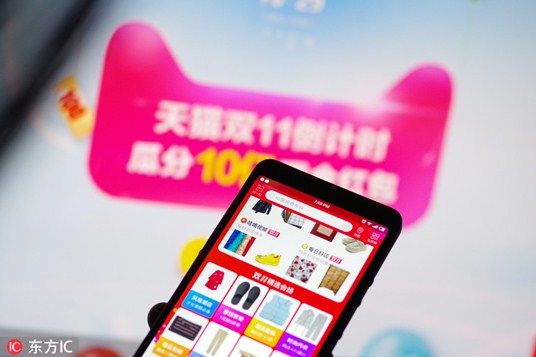Assessing the aftermath of Singles Day’s $38 billion shopping frenzy
 |
|
A Chinese mobile phone user browses online shopping site Taobao.com, a part of Chinese e-commerce giant Alibaba Group, on his smartphone during the Taobao & Tmall 11.11 Global Shopping Festival in Ji'nan, East China's Shandong province, on Nov 11, 2018. [Photo/IC] |
Shopping records were broken, tills were broken and with that the biggest shopping festival in China ended for 2019. With that, the dust is finally settling for outside observers as headline numbers are released by Alibaba and internal audits begin for 2019. According to Alibaba, they’ve raked in more than $38 billion in Gross Merchandise Value in Singles' Day sales for over 200,000 brands that participated in the "11.11 Global Shopping Festival".
By any stretch of the imagination or comparison with any e-commerce platforms worldwide, including Amazon, this is quite a record.
But what drove this shopping frenzy by Chinese shoppers? Was it bargain hunting at its peak? Was it buy now, try now and return the goods if not suitable or not needed or ordered by mistake? It was "New consumption patterns, new brands, emerging e-commerce shopping demographics and new shopping experiences", said Alibaba Group's newly-appointed Executive Chairman and CEO Daniel Zhang.
Having seen the number published by Alibaba, it seems that concerns should be laid to rest about Chinese consumers tightening their wallets or boycotting American brands due to ongoing geo-political and trade tensions. In all this hullabaloo, one tends to forget the most important task is to make sure that every shopper receives their goods delivered as ordered and on time.
So, one major improvement needed is the logistics and delivery network (offline customer experience), which is lagging far behind Alibaba's seamless online shopping experience. To sort out 1.3 billion delivery orders while making sure every single parcel is delivered to its rightful recipient has been a gargantuan task and an important one, bearing in mind the average delivery order value was just under $30.
The other challenge for Alibaba is the rapid expansion of JD.com and relative newcomer Pinduoduo, both of which have a better hold over smaller cities and towns and more organized logistics network. Alibaba recently announced investment of an additional $3.3 billion in its logistics company, Cainiao. It will be interesting to watch Alibaba managing deliveries on time for 2020 Singles' Day, assuming that 2020 will be a just as successful or even bigger Singles' Day sale event.
It is also worth noting that while numbers released by Alibaba are impressive, they are not reflective of Alibaba's revenues. The critical data missing is the amount of orders that eventually get returned and refunded. Critical though this data is, what the 11.11 Global Shopping Festival showcases is the capability of Alibaba's digital infrastructure and renewed hope that subdued year-on-year growth outside Singles' Day will help improve Alibaba's overall fortunes.
The recent milestones also have helped Alibaba win investor confidence when it began trading on Hong Kong's Hang Seng Index on Nov 26. By selling shares worth at least $11 billion, it hopes to further improve its digital transformation, especially its logistics infrastructure in small cities and towns across China.
The author is the founder and CEO of TripCenter.net, the world’s No 1 integrated and aggregated passenger ground transport marketplace.

